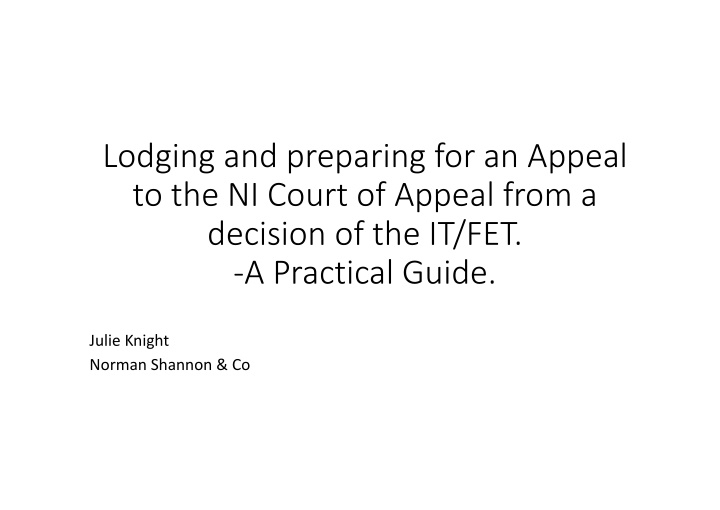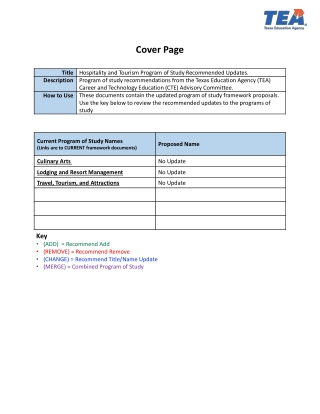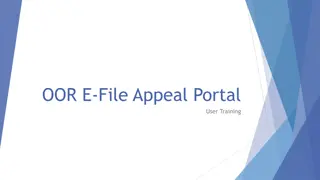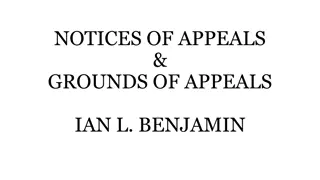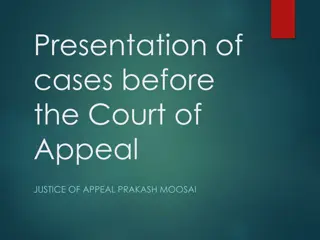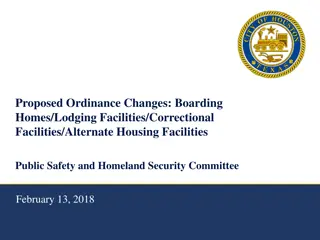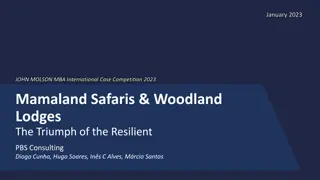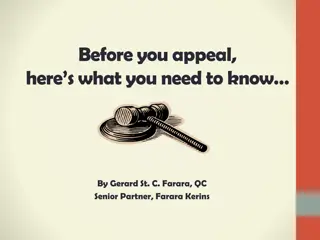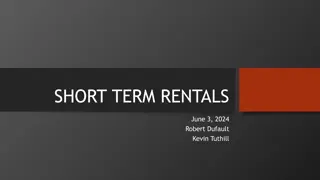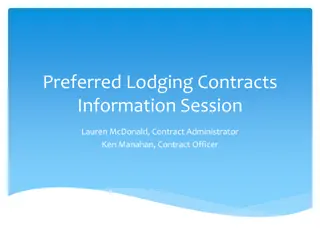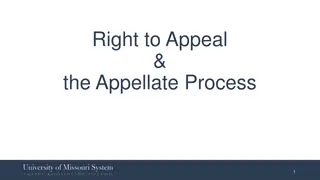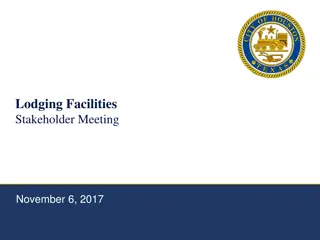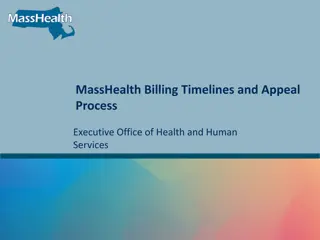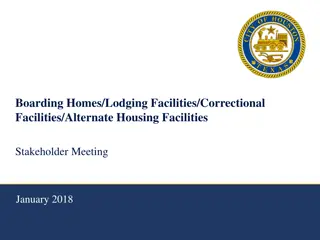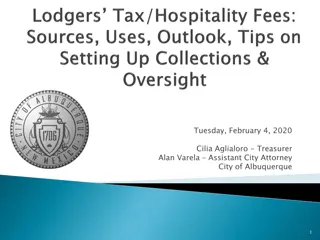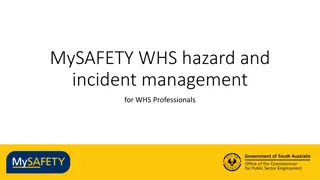Guide to Lodging and Preparing an Appeal to NI Court of Appeal
This practical guide provides essential information on lodging and preparing for an appeal to the NI Court of Appeal from a decision made by the IT/FET. It discusses the right to appeal, points of law for appeal, preliminary considerations, and funding options for the appeal process. Understanding the process and requirements is crucial for parties dissatisfied with a decision before an industrial tribunal to navigate the appeal process effectively.
Download Presentation

Please find below an Image/Link to download the presentation.
The content on the website is provided AS IS for your information and personal use only. It may not be sold, licensed, or shared on other websites without obtaining consent from the author.If you encounter any issues during the download, it is possible that the publisher has removed the file from their server.
You are allowed to download the files provided on this website for personal or commercial use, subject to the condition that they are used lawfully. All files are the property of their respective owners.
The content on the website is provided AS IS for your information and personal use only. It may not be sold, licensed, or shared on other websites without obtaining consent from the author.
E N D
Presentation Transcript
Lodging and preparing for an Appeal to the NI Court of Appeal from a decision of the IT/FET. -A Practical Guide. Julie Knight Norman Shannon & Co
Right to Appeal from IT/FET decision Article 22 Industrial Tribunals (NI) Order 1996 Article 90 FETO 1998 A party to proceedings before an industrial tribunal who is dissatisfied in point of law with a decision of the tribunal may, according as rules of court may provide, either (a)appeal therefrom to the Court of Appeal, or (b)require the tribunal to state and sign a case for the opinion of the Court of Appeal. (In summary this is an appeal to the superior court on the basis of an agreed set of facts specified by the inferior court/tribunal for the superior court to make a decision on the application of the law to those facts).
Appeal is on point of law only The tribunal is the sole arbiter of fact. Any decision of fact made by an employment tribunal is decisive. There is no power to interfere with a tribunal's decision unless it can be shown: (a) that the tribunal misdirected itself in law or misunderstood the law or misapplied the law; or (b)that there was no evidence to support a particular conclusion or finding of fact; or (b)that the decision was either perverse in that it was one which no reasonable tribunal, directing itself properly on the law, could have reached, (d) the decision was obviously wrong (see British Telecommunications plc v Sheridan [1990] IRLR 27 at 30, per Lord Donaldson MR)
Preliminary considerations What are the tribunal s reasons? Note that if the decision has been delivered orally at the hearing and you are not happy with the decision, you can request under Rule 30(3) & (5) of the Rules of Procedure written reasons, either orally at the hearing or in writing within 14 days of the date upon which the decision is sent to the Parties Are there grounds for review? Rule 34 of the Industrial Tribunals (Constitution and Rules of Procedure) Regulations (Northern Ireland) 2005 5 Grounds for review including: (d) new evidence has become available since the conclusion of the hearing to which the decision relates, provided that its existence could not have been reasonably known of or foreseen at that time; or (e) the interests of justice require such a review How will the appeal be funded? Emergency legal aid application, Equality Commission NI, trade union, legal expenses insurance, PILS
Obtaining documentation from OITFET 1. A certified copy of the decision write to request same from OITFET explaining that this is required for the purposes of an appeal to the Court of Appeal 2. Transcript of Digitally Recorded Hearings The President s Practice Direction dated 7 May 2012 amended on 1 June 2018 Apply in writing to the Secretary to the Tribunals and provide all of the following information:- (i) full details of the case, including names of the parties, dates and times of hearings and presiding Employment Judges; and (ii) detailed reasons for making the application: in other words why is the transcript necessary for the purpose of challenging or defending the decision in the Court of Appeal or in the High Court. The Employment Judge may grant the application if satisfied that (a)a recording of the relevant proceedings is in existence; and (b)the party making the application; i. has lodged an appeal to the Court of Appeal or has lodged an application for judicial review to the High Court; or ii. is a respondent to such an appeal or judicial review application; and (c) the transcript is necessary for the purpose of challenging or defending the decision in the Court of Appeal or High Court.
Direct Appeal Process Rules of the Judicature (NI) 1980 Order 60B was introduced by the Rules of the Court of Judicature (Northern Ireland) (Amendment) 2010 which came into effect on 1 April 2010 prescribes the procedure for appeals from decisions of the IT/FET. . (1) Except where the Court of Appeal has given leave to appeal under Order 94 rule 2(3), an appeal to the Court of Appeal from an Indus trial Tribunal under Article 22 of the Indus trial Tribunals (Northern Ireland) Order 1996 or the Fair Employment Tribunal under Article 90 of the Fair Employment and Treatment (Northern Ireland) Order 1998 shall be brought by notice of appealwhich must state the questions of law on which the appeal is brought. (2) Within 6 weeks of the appellant receiving a copy of the tribunal s decision the appellant must serve the notice of appeal on all parties to the proceedings and the tribunal. Order 3 Rule 2 (2) which specifies that Where the act is required to be done within a specified period after or from a specified date, the period begins immediately after that date . The Court of Appeal may on application by a party extend the time limit for lodging the Appeal Notice. Order 5 The court fee for issuing the Notice of Appeal is currently 550.00. There is no requirement for the Respondents to file a Response or Notice of Dispute
Contents of the Notice of Appeal 1. Must identify the Appellant and the decision being appealed 2. Must set out the grounds of the appeal ie the basis upon which it is contended that the tribunal erred in law. E.g. Interpretation and application of the relevant statutory provisions Misdirection as to the correct legal test Substitution Ignoring and/or failing to take into account relevant evidence/failing correctly to weigh the evidence Matters of procedural unfairness and bias Perversity of the findings of fact and reasoning Failing to give adequate reasons contrary to Regulation 30 of the IT Rules of Procedure Regulations NI 2005 3. Must set out the relief sought. E.g. reversal of the decision, remitting to the tribunal, costs of appeal, costs of remitted hearing If appropriate, flag up any intention to seek a protective costs order.
Powers of the Court of Appeal Section 34 General Jurisdiction of the Court of Appeal Section 38 Judicature (NI) Act 1978 sets out the powers of court for purposes of appeals. In hearing and determining an appeal from a decision of ITFET the Court of Appeal shall, in addition to all other powers exercisable by it, has all the jurisdiction of the original court and may confirm, reverse or vary the decision or determination of the original court; remit the appeal or any matter arising thereon to the original court with such declarations or directions as the Court of Appeal may think proper; adjourn the hearing from time to time; make such order as to costs and expenses incurred in the appeal and in the proceedings in the original court as the Court of Appeal thinks fit; in special circumstances order that such security shall be given for the costs of an appeal as may be just; make such other order as may be necessary for the due determination of the appeal.
Setting the Appeal down for Hearing Order 60B Rule 2. (1) The appellant must , within 7 days after service of the notice of appeal enter the appeal for hearing by lodging in the Central Office (a) 2 copies of the notice of appeal; (b) a certified copy of the tribunal s decision; (c) any other documents which may be relevant to the appeal this will include a copy of the legal aid certificate if applicable It should be noted that the Court of Appeal Office also requires the Original stamped copy of the appeal to be lodged in court. Order 3 Rule (5) Where, apart from this paragraph, the period in question, being a period of 7 days or less, would include a Saturday, Sunday or bank holiday, Christmas Day or Good Friday, that day shall be excluded.
Getting Ready for the Hearing Practice Direction 01/2016 - This sets out the current requirements in the Court of Appeal as to timetabling and submission of skeleton arguments, trial bundles and books of appeal. It makes provision for the electronic submission of documents. After setting down the Appeals and Lists Office will list the case in a callover and notify the parties of this and a proposed date for listing the appeal The appeal shall be listed for hearing not earlier than the expiration of 21 days from the date of setting down unless the parties request an earlier date and provide written consent of both the appellant and the respondent. At the callover the parties should be in a position to confirm the suitability of the date and the duration of the appeal and to deal with any outstanding legal aid or costs issues or other matters. The parties try to agree a date for hearing. The date for hearing will be fixed. The timescales for lodging documentation are set out in the Practice Direction and are calculated with reference to the date of hearing.
Skeleton Arguments The moving party must lodge their skeleton argument with the Court of Appeal 13 working days before the Hearing. The respondent(s) must lodge their skeleton argument preferably in an electronic format on or before 8 working days irrespective of whether they have the moving party s skeleton. Must be typed and shall state: -The name of the party providing the skeleton argument; -The full title and record number of the proceedings -The name of counsel and the solicitor appearing on behalf of that party.(Or the phrase acting in person in the case of litigants in person). -References to documents the Book of Appeal should be by page number, paragraph and line number. -Relevant statute should be properly cited by article, section, regulation etc. -References to authorities shall be cited with reference to the particular page number and paragraph reference for the passage in the case, textbook or journal. Schedules to the Skeleton Arguments (Examples are annexed to the Guidance) List of Authorities identifying core authorities Chronology of Events List of key persons and their roles
Books of Appeal It is the responsibility of the Applicant/Appellant to prepare the Books of Appeal 4 Books of Appeal must be lodged in the Court of Appeal Office at least 13 working days before the hearing date. An additional book of appeal must be furnished to the other parties The Appeal Books must be indexed and paginated, with each page numbered sequentially and each document should be numbered and separated by a divider. The book of appeal should not exceed 500 pages otherwise an agreed core bundle not exceeding 250 pages will have to be prepared and lodged 4 working days before the hearing. It is suggested that the document bundle should be prepared to reflect the case being made on appeal and should only comprise documents which are necessary for the appeal i.e. they are relevant and likely to be referred to at the hearing. Liaise with the other parties Avoid duplication and illegible copies of documents Ensure that all documents referred to in the skeleton argument are included in the Bundle
Contents of the Book of Appeal 1. The legal aid certificate (if any) granted to the appellant and / or respondent; 2. The Notice of Appeal dated ( ) ; 3. Certified Decision of the IT/FET 4. Statement of Issues 5. Claim Form 6. Response Form (s) 7. Request(s) by the Parties for Additional Information and Replies 8. Replies to Requests for Additional Information 9. Any Statutory Questionnaires and Responses 10.The transcript of (extracts of) the evidence 11.Witness statements 12.Written Closing Submissions of Counsel, if available. 13.Any other documents which may be relevant to any question at issue on the appeal from the tribunal hearing bundle eg. Correspondence, emails, contract of employment, employment policies.
Books of Authorities 4 copies Should be lodged in the Court Office at least 7 working days before the Hearing If there are less than 15 authorities, these should be submitted in hard copy 15+ authorities should be submitted in electronic form either in a Word document or an unlocked PDF -scanned PDF documents are not acceptable. A joint bundle of authorities is preferable. The bundles of documentation should be complete at the time of lodgment. A party wishing to submit any supplemental material must apply in writing to the Court of Appeal to list an application to seek leave of the Court. The moving party must be in a position to explain why the documentation concerned was not included in the first place. (Practice Direction 1/2016, paragraph 13) Request a read receipt from the Court of Appeal where documents are submitted by email.
